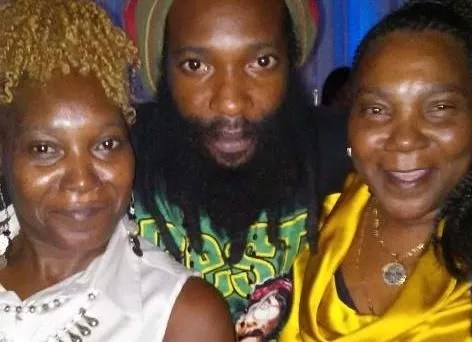
Photo provided by Cooper family attorney Rawsi Williams

Audio By Carbonatix
On March 8, 2022, Antwon Cooper was driving back from work with a friend in Liberty City, when he was pulled over by Miami police in a fatal encounter that ended with a bullet to Cooper’s head.
Officer Olivier Gonzalez stopped Cooper for speeding and what appeared to be illegally tinted windows around 4:30 in the afternoon, according to police. As captured on the officer’s body-worn camera, Gonzalez asked the 34-year-old to step out of the car after he admitted he didn’t have a drivers license. Cooper, a Black man with long dreadlocks, exited the red Nissan and was patted down by Gonzalez before trying to break free.
That’s when the camera falls to the ground and a single gunshot is heard in the background. It was fired off by Sgt. Constant Rosemond, who discharged his weapon at Cooper upon arriving on the scene to find him scuffling with Gonzalez. A 9mm pistol allegedly belonging to Cooper was found on the street several feet away from his body.
The Miami-Dade State Attorney’s Office announced in January following a nine-month probe that it would not be pressing charges against Rosemond, deeming it “reasonable for him to believe that deadly force was necessary to prevent imminent death or great bodily harm to himself or Officer Gonzalez.”
Cooper’s mother Talisha has challenged that narrative ever since.
She is now suing the City of Miami and Rosemond in federal court, laying out her family’s long-held stance that Cooper was clearly unarmed during the incident and posed no immediate threat to police.
The family says that in the aftermath of the shooting, the Miami Police Department falsely stated that Rosemond opened fire because he saw Cooper armed with a gun. In reality, the family claims, neither of the officers saw the pistol in Cooper’s possession amid the tussle.
“Nobody… was in imminent danger of serious bodily harm or death until Sgt. Rosemond came on the scene and unlawfully shot Antwon,” the wrongful death lawsuit filed March 13 by Cooper’s family alleges. “Sgt. Rosemond was the danger.”
According to the lawsuit, instead of using deadly force as a last resort, Rosemond used it as his first option “less than one minute” after arriving, as shown by body-cam footage. The family claims that Cooper never punched or struck Gonzalez during the encounter and was not trying to hurt officers.
“In fact, Rosemond was close enough to have simply assisted Gonzalez to subdue Antwon,” the lawsuit alleges.
Neither a City of Miami spokesperson nor a Miami police union representative has responded to New Times‘ requests for comment.
The state attorney’s office claims footage of the incident shows the Hellcat pistol (which the memo identifies as Cooper’s) was not in the roadway before the tussle – meaning it was dropped during the struggle.
But the lawsuit raises questions about the origins of the gun, claiming it did not appear in any photos near Cooper’s body. The gun was never seen in Cooper’s possession in body-cam footage, surveillance footage, or by eyewitnesses, the family says.
A Florida Department of Law Enforcement investigation showed that it was only after Rosemond shot Cooper that witnesses observed the pistol, which by then was lying on the concrete, according to the lawsuit.
“That gun was not traced to Antwon, nor conclusively matched to Antwon,” it reads.
Prosecutors maintain Rosemond pulled up to find “Gonzalez and Cooper engaged in a violent struggle,” and that he opened fire after seeing Cooper “on top of Gonzalez, as Gonzalez struggled to keep control of Cooper’s hands.” The memo describes Rosemond’s decision to shoot as “reasonable and legally justified.”
According to prosecutors, the pistol was on the ground in view of Rosemond when he arrived at the scene and discovered the two men locked in a struggle.
Rosemond, a Black officer who has worked for the Miami Police Department for 15 years, did not provide a formal statement in the state attorney’s office probe into the shooting.
Investigators collected DNA swabs on the pistol, but the state attorney’s office redacted the results from its memo on account of a Florida DNA-privacy law.
The Cooper family’s attorney Rawsi Williams claims the results were a “low partial” match to Cooper. In a statement, Williams says police are using the gun as “a red-herring distraction” to draw attention away from the fact that Cooper was unarmed when he was shot. She has called for Rosemond’s arrest and an apology from the state attorney’s office.
“[Antwon] and his fiancé will never be married. He will never have children. His family will never have grandchildren or great-children from Antwon… They lost the companionship of their son for their lives,” the lawsuit states.